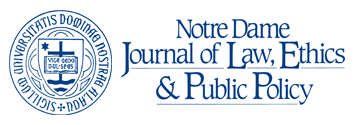Notre Dame Journal of Law, Ethics & Public Policy Online
Document Type
Note
Publication Date
8-15-2014
Abstract
This Note will examine how Justice Lewis F. Powell and Justice Thurgood Marshall’s individual experiences affected their jurisprudence concerning educational issues. Part I will provide a brief biography of each Justice, relaying the experiences that shed light on their education perspective.
Part II will contrast the Justices’ views on mandated busing as a remedy for integration. Justice Powell believed court mandated busing was unconstitutional, significantly disrupted education, and imposed on local officials’ responsibility to integrate. Conversely, Justice Marshall felt that forced busing was a constitutional means to integrate a divided society maintained by local segregation. Part III will contrast the Justices’ views on educational funding schemes. Once again, the two Justices found themselves on different sides of the same coin and held opposing views on how the Equal Protection Clause should apply to Texas’s educational funding scheme. Part IV will focus on the transition from racial integration to rectification as the Court grappled with defining ‘equality’ and the constitutionality of implementing affirmative action programs. Part V will discuss Powell and Marshall’s differing viewpoints on affirmative action admissions programs best illustrated in Regents of University of California v. Bakke. By applying the Justices’ arguments in Bakke and jurisprudential patterns to the affirmative action case currently under consideration by the Supreme Court, Fisher v. University of Texas at Austin, this Note will predict their decisions as if they were still on the bench.
Recommended Citation
Stephenson, Adreanne, "Two Sides of the Same Coin: Justice Powell and Justice Marshall's Perspectives on Education and the Law" (2014). Notre Dame Journal of Law, Ethics & Public Policy Online. 1.
https://scholarship.law.nd.edu/ndjlepp_online/1


